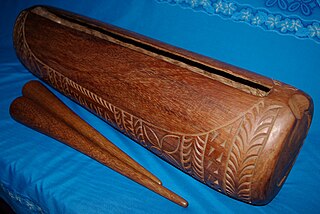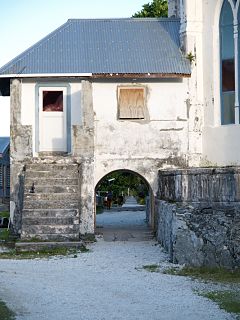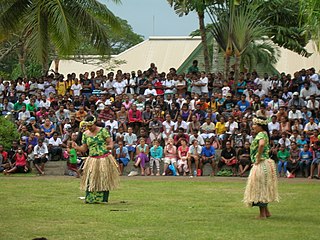
The vast majority of people in Tokelau are Christians and Christianity plays a significant role in the Tokelauan way of life.

The vast majority of people in Tokelau are Christians and Christianity plays a significant role in the Tokelauan way of life.
Missionaries preached Christianity in Tokelau from 1845 to the 1860s. French Roman Catholic missionaries on Wallis Island (also known as 'Uvea) and missionaries of the Protestant London Missionary Society in Samoa used native teachers to convert the Tokelauans. Atafu was converted to Protestantism by the London Missionary Society, Nukunonu was converted to Catholicism and Fakaofo was converted to both denominations. Since 1992 the Roman Catholic Mission Sui Iuris of Tokelau has represented the Catholic church in Tokelau.
In 2006, all people who answered the religion question on the Tokelauan census gave one of the major Christian denominations as their religion.
In 2011, 58.5% of respondents belonged to the Congregational Christian denomination and over one-third of respondents (36.8%) belonged to the Roman Catholic denomination. Of the remaining 4.7%, 1.8% were Presbyterian, 0.1% belonged to Spiritual and New Age religions, and 2.8% belonged to other Christian denominations.

The majority of Tokelau's usually resident population living on Atafu (89.8%) and Fakaofo (68.9%) in 2011 were Congregational Christians. Congregational Christian has remained the major denomination on Atafu and Fakaofo since the 2006 Census, but the proportion of residents who report belonging has decreased.
In 2006, 95.4% of residents on Atafu and 70.7% on Fakaofo were Congregational Christians.
Roman Catholic has remained the major denomination of Nukunonu residents since the 2006 Census. In 2011, 93.9% of usual residents were Roman Catholics, compared with 96.9% in 2006.
Since the 2006 Census, the proportion of Congregational Christians on Nukunonu has increased markedly, from 2.1% in 2006 to 4.5% in 2011. On Atafu, the proportion of Roman Catholics also had a notable increase, from 0.2% in 2006 to 2.4% in 2011.
On Fakaofo, there was an increase in its second-largest religious denomination (Roman Catholic). In 2011, 25.9% of Fakaofo residents were Roman Catholics, compared with 22.2% in 2006.

Tokelau is a dependent territory of New Zealand in the southern Pacific Ocean. It consists of three tropical coral atolls: Atafu, Nukunonu, and Fakaofo. They have a combined land area of 10 km2 (4 sq mi). The capital rotates yearly among the three atolls. In addition to these three, Swains Island, which forms part of the same archipelago, is the subject of an ongoing territorial dispute; it is currently administered by the United States as part of American Samoa. Tokelau lies north of the Samoan Islands, east of Tuvalu, south of the Phoenix Islands, southwest of the more distant Line Islands, and northwest of the Cook Islands.

The music of Tokelau occurs in the atolls of Atafu, Nukunonu, and Fakaofo. It is dominated by communal choral activity in harmony, with percussive accompaniment including log drums (pate), pokihi and apa. Nukunonu is notable for traditional song and dance.
Tokelau may refer to:
Tokelauan is a Polynesian language spoken in Tokelau and on Swains Island in American Samoa. It is closely related to Tuvaluan and is related to Samoan and other Polynesian languages. Tokelauan has a co-official status with English in Tokelau. There are approximately 4,260 speakers of Tokelauan, of whom 2,100 live in New Zealand, 1,400 in Tokelau, and 17 in Swains Island. "Tokelau" means "north-northeast".

Nukunonu is the largest atoll within Tokelau, a dependency of New Zealand, in the south Pacific Ocean. It comprises 30 islets surrounding a central lagoon, with about 5.5 km2 (2.1 sq mi) of land area and a lagoon surface area of 109 km2 (42 sq mi). Motuhaga is the only islet that has inhabitants. The estimated population is 80-120.

The politics of Tokelau takes place within a framework of a parliamentary representative democratic dependency. The head of state of Tokelau is Queen Elizabeth II in right of her Realm of New Zealand, who is represented by an Administrator. The monarch is hereditary, the Administrator is appointed by the New Zealand Minister of Foreign Affairs and Trade.

Kuresa Nasau is a Tokelauan politician who has served as head of government seven times and as faipule of Atafu.

As recent as the 2011 census, Christianity was the largest religion in Scotland. In the 2011 census, 53.8% of the Scottish population identified as Christian when asked: "What religion, religious denomination or body do you belong to?". The Church of Scotland, a Presbyterian denomination often known as The Kirk, is recognised in law as the national church of Scotland. It is not an established church and is independent of state control. However, it is the largest religious grouping in Scotland, with 32.4% of the population according to the 2011 census. The other major Christian church is the Catholic Church, the form of Christianity in Scotland prior to the Reformation, which accounts for 15.9% of the population and is especially important in West Central Scotland and parts of the Highlands. Scotland's third largest church is the Scottish Episcopal Church. There are also multiple smaller Presbyterian churches, all of which either broke away from the Church of Scotland or themselves separated from churches which previously did so. According to the 2019 Scottish Household survey, since 2009, there has been an increase in the proportion of adults reporting not belonging to a religion to 56%. The trend of declining religious belief coincided with a sharp decrease since 2009 in the proportion of people who report that they belong to the Church of Scotland, from 34% to 20% of adults. Furthermore 13% reported belonging to the Catholic Church.

The Roman Catholic Mission Sui Iuris of Tokelau in Tokelau is a suffragan mission of the Roman Catholic Archdiocese of Samoa-Apia. It was formed in 1992 when the Archdiocese of Samoa-Apia and Tokelau was split into the Archdiocese of Samoa-Apia and the Mission Sui Iuris of Tokelau. The current Ecclesiastical Superior is Archbishop Alapati Lui Mata’eliga, appointed 22 December 2015.

A referendum on self-determination was held in Tokelau on 20 October and on 22–24 October 2007, with the result being that self-governance was rejected. Had it been successful, the referendum would have changed Tokelau's status from an unincorporated New Zealand territory to a self-governing state in free association with New Zealand, akin to the Cook Islands and Niue. However, the referendum required a two-thirds positive vote to pass, and the "yes" side fell short of the required total by 16 votes.
Religion in New Zealand encompasses a wide range of groups and beliefs. Almost half of New Zealanders stated they had no religion in the 2018 census and 6.7 percent made no declaration. However, Christianity remains the most common religion; 37 percent of the population at the 2018 census identified as Christian. Around six percent of the population is affiliated with non-Christian religions. Hinduism is the second-most popular religion, claiming 2.6 percent of the population, and Sikhism is the fastest-growing faith.

Christianity in Angola has existed since 1491. Today 80% of Angolans practise some form of Christianity.

The following outline is provided as an overview of and topical guide to Tokelau:

The Catholic Church in Samoa is part of the worldwide Catholic Church, which, initiated by the life, death and resurrection of Jesus Christ, and under the spiritual leadership of the Pope and Roman curia in the Vatican City is the largest Christian church in the world. Catholic missionaries arrived in Samoa in 1845 and today Catholics account for around 20% of the overall population. Archbishop Alapati Lui Mataeliga was ordained as head of the Archdiocese of Samoa-Apia in 2003.

Tokelau has two official languages: Tokelauan and English. Over 90% of the population speaks Tokelauan, and just under 60% speak English. Also, 45.8% of the population speak Samoan, and small percentages of the population speak Tuvaluan and Kiribati.
The following is an alphabetical list of articles related to Tokelau.

Oceania is a region centered on the islands of the tropical Pacific Ocean. Conceptions of what constitutes Oceania vary, with it being defined in various ways, often geopolitically or geographically. In the geopolitical conception used by the United Nations, International Olympic Committee, and many atlases, the Oceanic region includes Australia and the nations of the Pacific from Papua New Guinea east, but not the Malay Archipelago or Indonesian New Guinea. The term is sometimes used more specifically to denote Australasia as a geographic continent, or biogeographically as a synonym for either the Australasian realm or the Oceanian realm.
Internet in Tokelau is provided by Teletok, the government-owned communications corporation, and Taloha Inc., a private company formed by the Dutch Joost Zuurbier.
Smoking in Tokelau is prevalent, with ethnic Tokelauans having the highest smoking prevalence of all Pacific ethnicities. In the 2011 Tokelau Census, 47.8% of people aged over 15 were found to be regular cigarette smokers.

Tokelauan people are the indigenous Polynesian people of Tokelau, an island group in Polynesia, in the Pacific Ocean. The native language of the Tokelauans is Tokelauan.
This article contains content derived from the 2011 Tokelau Census, produced by Statistics New Zealand, which is licensed under the Creative Commons Attribution 3.0 New Zealand License. See [1] for the full citation.